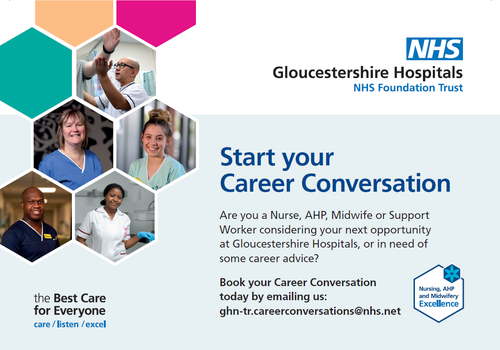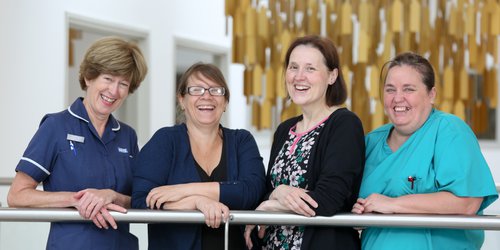Career development

For all nursing, AHP, midwifery and support worker colleagues, if you're interested in developing or progressing your career in Gloucestershire Hospitals, there are a number of ways you can do this. Find out how to get started.
We think it’s important that you take centre stage in your own career development and yet we appreciate it can sometimes be difficult to know where to begin. Our Career Development page will help support you in providing advice, resources and guidance.
Start your journey with our Prepare to Progress Top Tips for career guidance.
Career pathways
There are several different career pathways available in Gloucestershire Hospitals, which include:
- nursing and HCA career pathway
- nursing supporting education - prepare to progress
- nursing ED career pathway
- infection prevention control pathway
- midwifery career pathway
- maternity clinical support career pathway
- AHP pathways - under development
- AHP support worker pathways can be found on our AHP intranet page
Career stories
Read some career stories written by colleagues, find out how they progressed in their careers and the different routes available.
- Maria Smith, Head of Professional Education and Apprenticeships and Careers Team
- Sam Lignelli, Practice Educator for TNA and Care Certificate
- Liz Abraham, Practice Educator for TNA and Care Certificate
- Alison Jones, Joint Professional Education Manager and International Recruitment Programme Lead
- Read our AHP career stories
- Read our AHP Return to Practice stories
- International midwife career stories
- In Black History Month 2022, we showcased stories of nursing staff from different ethnic minority backgrounds
Continuing professional development (CPD) portfolio
NMC and HCPC registered staff are required to keep records of their continuing professional development (CPD) to maintain their professional registration. However, CPD does apply to everyone. A fantastic way to support your career is to collect a portfolio to capture your feedback and activities.
The evidence you collect in your portfolio has many benefits and uses, for example:
- job application
- my Development Conversation
- professional registration requirement
- improved career prospects
- prepared for future challenges
- increased motivation and morale
- increased personal confidence.
You may be eligible for funding to support your CPD activity
There are many ways to develop yourself and your career, including training courses, studying for a qualification, and self-directed and on-the-job learning. You can find out more about these in our learning opportunities page.
There are two other areas on the intranet to visit for information on the Trainee Nursing Associate Apprenticeship and Professional Education.
Career conversations
Career Conversations are an opportunity to reflect and discuss your current role and the types of work that you find most rewarding and energising with someone other than your line manager. They allow time to consider how much opportunity there is for you to feel fulfilled, and how well your role fits and balances with life outside of work.
In addition, career conversations provide an opportunity to reflect upon where you are within your career, and for you to think through some of your aspirations and needs in the short and longer-term, including your intentions and motivations.

Reflecting upon our level of satisfaction in our current role can enable us to focus upon what can be done to ensure that it remains worthwhile and fulfilling. Additionally, the opportunity to explore and understand what other options exist, and how you might make this transition, could be useful.
If you're not sure how to move forward with your career or feel you're at a crossroads, use the Prepare to Progress Top Tips for guidance.
Once you have worked through the tips, and still feel unsure as to where your career journey is heading, book your Career Conversation by emailing ghn-tr.careerconversations@nhs.net
Book your Career Conversation by emailing ghn-tr.careerconversations@nhs.net
The Career Conversations team
Beverley Jones, Lead Nurse – Continual Professional Development
Beverley has 25 years’ experience as a Registered Children’s Nurse, currently working as our Lead Nurse for Continual Professional Development. She is an NMC Nurse Teacher and qualified Professional Nurse Advocate and seeks to empower colleagues in the workplace to thrive and flourish through development and wellbeing support. Alongside her RCN representative roles, Beverley leads Legacy Mentoring (nursing) and pastoral support for Internationally Educated Nurses, with over 15 years’ experience of being a recruiting manager. Beverley has been a core team member within the Magnet4Europe© research project, and the Nursing Excellence programme.
Emma Charman, AHP Preceptorship Lead
Emma qualified as a therapeutic radiographer in 1989 and joined the radiotherapy team at Cheltenham General Hospital in 1990. Emma worked her way through the clinical grades, before working as the radiotherapy manager for 3 years. Emma moved into the radiotherapy education lead post, supporting and training students and staff and completed a PGCert in Teaching and Learning for Health Professionals. Emma has trained as a Schwartz round facilitator, an Action Learning Sets facilitator and a Coach and did a secondment as a RePAIR fellow in the South West in 2021/22. Emma is currently doing a secondment as the AHP Preceptorship Lead for GHNHSFT and training to become a professional advocate.
Carole Preston, AHP Workforce Programme Lead
Carole qualified as a diagnostic radiographer in 1986 in Manchester and specialised in mammography. Carole moved to the South West in 1997 and has since held a variety of roles in her NHS career including at regional and national level. Carole has held positions in management, service improvement, education and organisational development and whilst mainly employed in the NHS, has also worked in the voluntary sector and been self-employed. Carole has trained and worked as a project manager, an Action Learning Set facilitator and a Coach. Carole returned to clinical practice in 2020 and is currently seconded into the role of AHP Workforce Programme Lead for GHNHSFT.
Sonia Denton-Smith, Professional Nurse Advocate, Clinical Lead
Sonia has been a Registered Adult Nurse for 13 years and worked in Critical Care for 8 years where she progressed into a Sister’s post after gaining her BSc in Critical Care Specialist Practice. Sonia qualified as a Professional Nurse Advocate in 2022 and is now Clinical Lead for Professional Nurse Advocacy at GHNHSFT. Sonia’s passion is supporting colleagues with their personal and professional development, wellbeing and quality improvement. Sonia has completed further masters-level Study in Health and Wellbeing in the workplace.
Contacts
Did you want to have a conversation with someone about the next steps in you career? Contact our career conversation team
Are you thinking about leaving your area? Or would you like someone to drop in and see you at work for some support? Speak to a legacy mentor
Are you feeling a bit bored and want a new challenge? Or are you feeling stressed, burnt out?/ overwhelmed? Professional Nurse Advocates or Professional Midwifery Advocates can help
Complete a job application
It's important you give yourself the appropriate time to complete an application form. Find a quiet space and ensure you have all the information required to hand.
You may need the following information to complete your application:
- your education and qualification history, including the date, result, and description of your qualifications
- details of your current roles responsibilities
- details of your previous role responsibilities (going back at least 3 years)
- referee contact details (you should check with your referees that they are happy to provide a reference for you when requested)
- the job description and person specification for the role you are applying for
If the form is online, you may want to draft larger sections offline in the first instance to avoid issues of timing out. Ensure you follow all instructions carefully and check how many screens you have to fill in before you can submit your application.
You should always ensure that you:
- check your form, especially for spelling and grammatical errors
- ask someone else to proof read it
- check you have filled in everything you need to and that all boxes are complete
- ensure you have demonstrated how you meet the person specification requirements in as positive a way as possible
- keep a copy of the completed form, so that you have a record of what you have written
- take note of the closing date and submit your application in the appropriate time
- If you are applying for a job on NHS Jobs, they have help and support for applicants
Prepare for your job interview
At some point in your career, it's likely that you will apply for a job opportunity which will result in you being invited to attend an interview. It is normal to feel nervous because you want to ensure you do your best.
If you prepare for the interview and also practice, this may help to allay any nerves and give you the best chance of getting the job.
Do
-
take time to prepare
-
research the role, department, priorities and potential challenges (you may benefit from speaking to someone within the department and interview panel members)
-
find the location of the venue ahead of time, so you give yourself enough time to get there
-
dress smartly (first impressions count)
-
turn off your mobile phone
-
think positive, remember to smile and maintain eye contact
-
Actively listen to questions and take your time in answering (think about scenarios ahead of the interview)
-
prepare a number of questions to ask at the interview
-
request feedback following your interview (you may need to arrange a follow up appointment to do this)
Don’t
-
do not arrive late
-
do not use slang, jargon, or swear
-
do not slouch in your seat
-
do not talk too fast
-
do not discuss controversial topics
-
do not read directly from your notes
We have also prepared a list of 10 tips for interview success.

